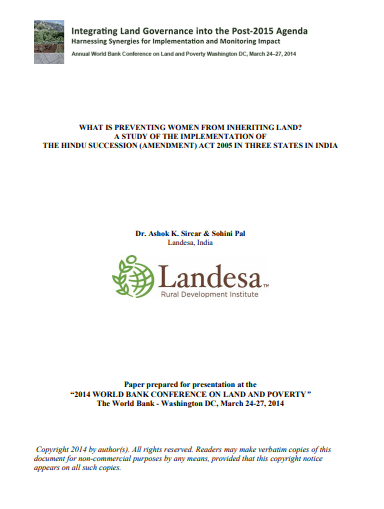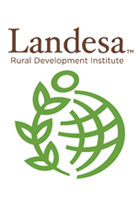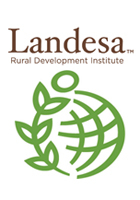About Landesa
Landesa partners with governments and local organizations to ensure that the world’s poorest families have secure rights over the land they till. Founded as the Rural Development Institute, Landesa has helped more than 105 million poor families gain legal control over their land since 1967. When families have secure rights to land, they can invest in their land to sustainably increase their harvests and reap the benefits—improved nutrition, health, and education—for generations.
Resources
Displaying 66 - 70 of 103Improving Land Governance in West Bengal: Land Governance Assessment Framework
This report comprises of a comprehensive assessment of the status of land governance in the Indian state of West Bengal, by using the World Bank’s Land Governance Assessment Framework (LGAF) during 2013-1014. This report presents its findings. The assessment was taken up in nine distinct thematic areas of land governance as envisaged in the LGAF.
Smallholder Farming and Achieving our Development Goals
A brief which takes on the myth that large mega farms are more modern and productive than smallholder farms. Concludes that by boosting the productivity of smallholders, governments and donors can increase food production and rural employment; reduce rural poverty through the commercialization of subsistence agriculture; and more effectively empower women. With secure rights to their land, access to markets, and credit and technology, smallholders can drive the growth of rural economies throughout the developing world.
WHAT IS PREVENTING WOMEN FROM INHERITING LAND? A STUDY OF THE IMPLEMENTATION OF THE HINDU SUCCESSION (AMENDMENT) ACT 2005 IN THREE STATES IN INDIA
March 2014 – Inheritance is the overwhelming way land is acquired in India, but societal practices exclude women from inheriting land. The Hindu Succession (Amendment) Act 2005, an inheritance law that covers 83.6% of the population of India, corrected some fundamental inequalities in the law bringing the women in equal status to men in the right to inherit land. However, eight years after its enactment, the ground reality is that women still do not inherit land on an equal basis with men.
SECURING WOMEN'S LAND TENURE IN NORTHERN UGANDA – A WOMEN FIRST APPROACH
March 2014 – This paper discusses a pragmatic, adaptive framework for understanding and taking action to strengthen women’s land tenure security in the context of customary tenure. The Framework defines secure land rights in terms of five elements, which each serves as the basis for distinct, measurable indicators upon which to base project assessment, design, and evaluation. This paper presents the Framework and suggests its potential as an analytical foundation for assessing the security of land rights, for designing projects or developing policies that protect and stren
FOCUS ON LAND IN AFRICA: LINKING PROPERTY RIGHTS AND DEVELOPMENT
March 2014 – In most of Africa, land is at the heart of economic, social and political life. Therefore, land and natural resource rights and governance issues profoundly affect and are affected by development initiatives across the continent. To fully succeed and contribute to ending extreme poverty in the post-2015 world, development initiatives must recognize and strengthen the land and natural resource rights of local people, especially the rural poor and women. However, while there is growing awareness of these issues, they are often overlooked.








